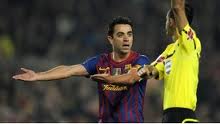By Monica Villar
May 14 – Calls for an overhaul of the Spanish refereeing system are becoming louder. Spanish referees have come under fire as the season comes to a close and poor decisions potentially mean life or death in the race to survive in la Liga’s top division.
Two weekends ago both Deportivo and Atlético were affected by Ayza Gámez’s poor decisions – a possible legal Atleti goal was disallowed, while Deportivo were denied two clear penalties.
Last weekend Celta, battling to keep their top division status, suffered at the hands of Teixeira Vitienes’ assistant when a goal by Celta’s Tuñéz in the final minutes of the game – which would have levelled the match – was wrongfully called offside by assistant Díaz Casado.
While it would be hard to blame relegation on a single decision – after all, it has taken a season of play for Celta to find themselves in their current position – to be relegated because of poor refereeing decision is unsatisfactory for clubs and the league.
Spanish referees, unlike their Italian or English counterparts, don’t have to be professional to officiate in the top division, many have other careers. Estrada Fernández, for example, is a civil servant, while Delgado Ferreiro runs his own business.
Other referees, like Undiano Mallenco, have chosen to make refereeing a career. Mallenco couldn’t combine his job as sub director for the Council of Pamplona with being a referee so he decided to stick with refereeing.
Spanish match officials can earn €200,000 a year, just under €3,500 per match and when they use their own car as transport they receive €0.19 per kilometre travelled. If on top of that they also referee European matches they can add €40,000 to their salary. In a tough economic climate it is no surprise that there has been a 30% increase in referees in Spain in the last few years.
With salaries attracting more referees, but into a system that appears to treat referring as more of volunteer activity than a professional one, there is a growing feeling change is needed. Many insiders believe a full time body of referees, following training courses, continual assessments and fitness regimes, would reduce the number of errors being made. Certainly, it would make referees more accountable.
Díaz Casado’s mistake has not gone unnoticed and as a result the RFEF (Royal Spanish Football Federation) and the CTA (Referee Technical Committee) have confirmed that Díaz Casado will not assist Teixeira Vitienes in the Valencia – Getafe match, due to take place this Saturday, in his place will be Cabañero Martínez.
Contact the writer of this story at moc.l1744769399labto1744769399ofdlr1744769399owedi1744769399sni@r1744769399alliv1744769399.acin1744769399om1744769399. Monica Villar is news editor of leading Spanish football website www.laliganews.tv

